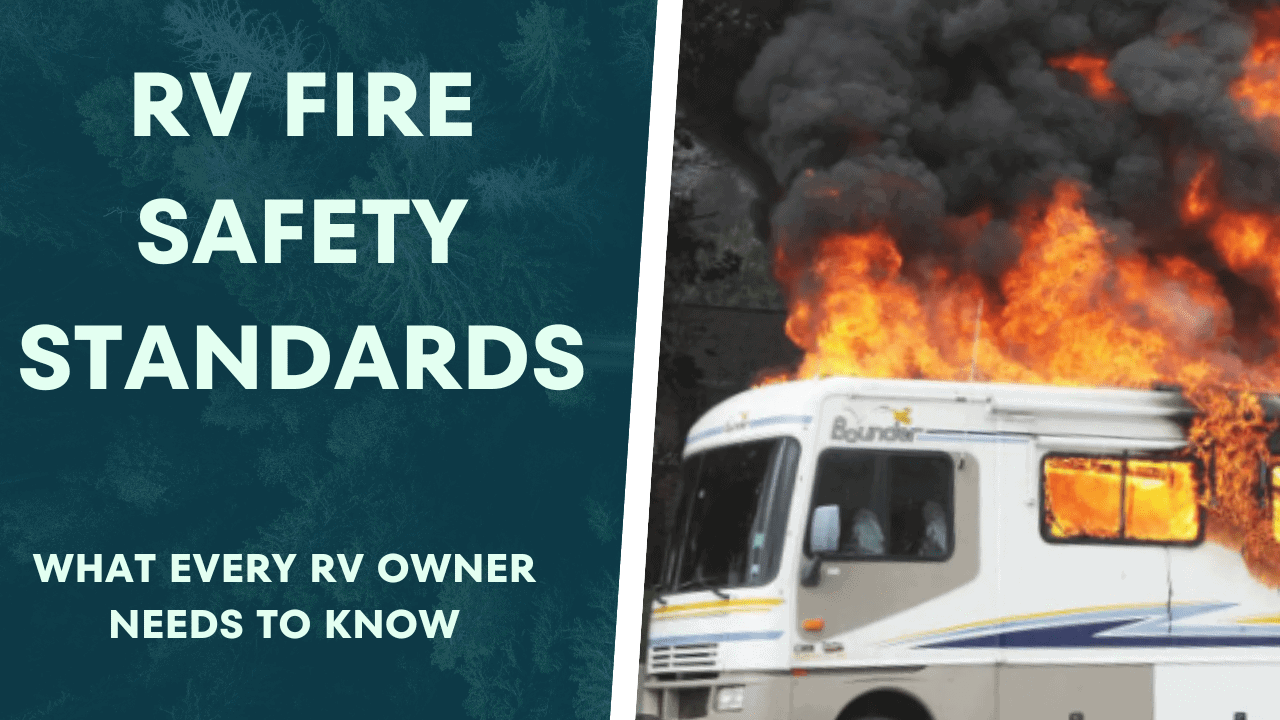RV Fire Safety Standards: What RV Owners Need to Know
Every year, tens of thousands of RVs and campers hit the roads to explore the world. As fun and exciting as this experience can be, it’s important to remember that these vehicles are highly flammable.
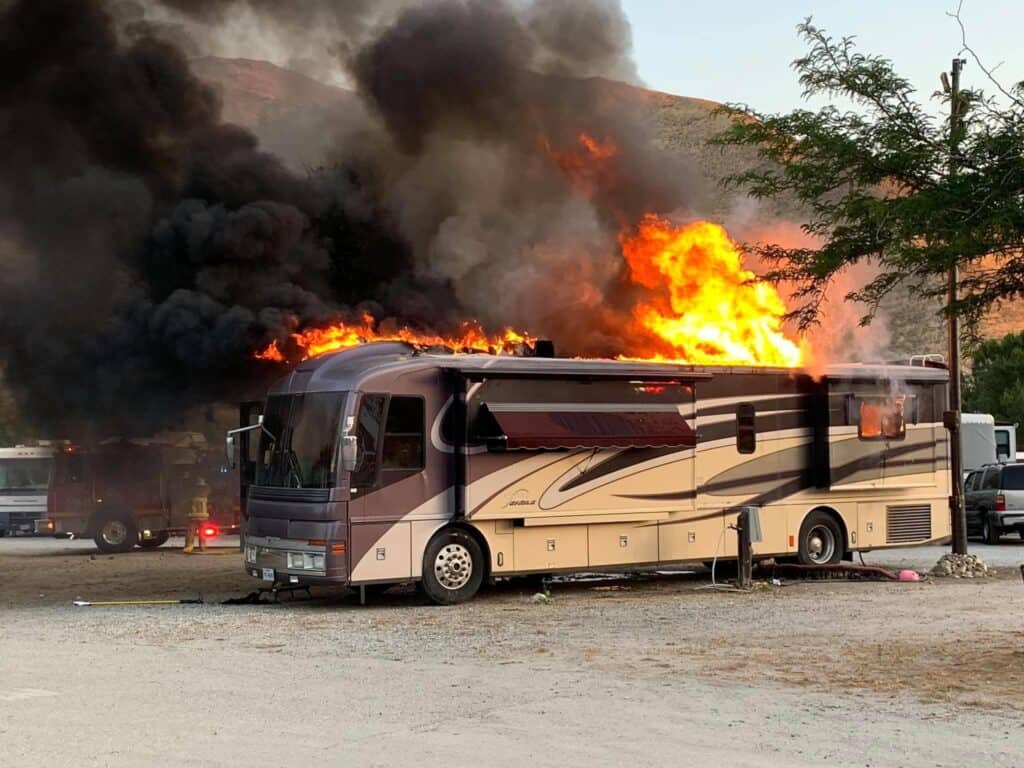
That’s why safety standards are so important — they help keep you and your family safe on the road. Let’s take a look at some statistics:
According to the National Fire Protection Association (NFPA), there were an estimated 4,100 recreational vehicle fires in 2018 alone. These fires caused an average of $7 million in property damage each year.
Link to the statistics.
So adhering to RV fire safety standards is essential for protecting yourself and others around you from harm. These standards include guidelines for everything from battery installation and electrical wiring inspection to proper maintenance and smoke detector placement.
Following these guidelines can help reduce the risk of fire, keeping your family safe while on the road.
There are many different regulations and standards in place that ensure RV fire safety.
For instance, NFPA 1192 is a code that outlines requirements for all types of recreational vehicles, including motorhomes, travel trailers, fifth-wheels, park models, van conversions, slide-in campers, and truck campers.
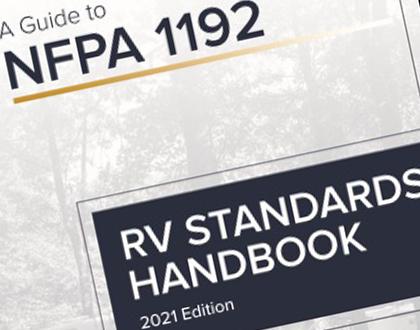
Additionally, both state and federal departments have their own set of regulations designed specifically for RVs and other types of recreational vehicles. It’s important to familiarize yourself with all relevant laws before hitting the open road in your camper or motorhome.
Understanding the types of Fire Hazards in RVs
There is always an element of risk associated with travel. One of those risks is fire – and while it’s not something that happens often, understanding potential fire hazards can help you stay safe while you’re out exploring. Let’s take a look at some of the most common causes of RV fires and how to reduce your risk.
Electrical Issues
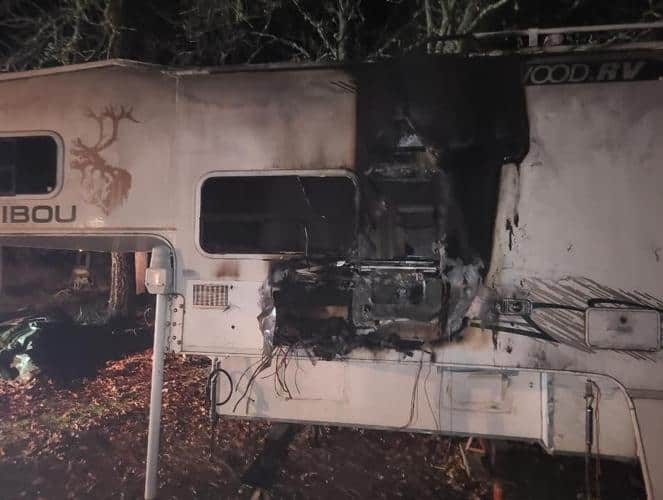
Electrical fires are one of the most common causes of RV fires.
In addition to routine maintenance and inspections, it’s important to be aware of potential electrical issues such as loose or damaged wiring, overloaded outlets, and improperly functioning circuit breakers.
It’s also important to make sure that any electrical appliances in your RV are UL approved so that they don’t pose a fire hazard.
Cooking Mishaps
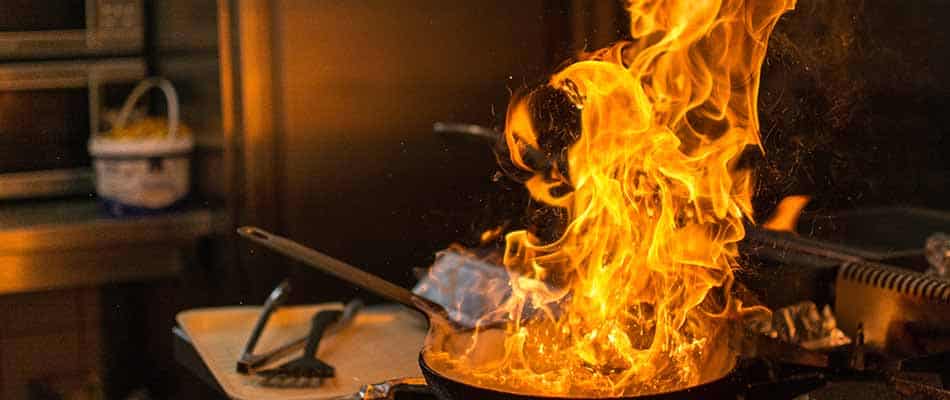
Cooking is another common cause of RV fires and should be done with caution.
Make sure that all cooking surfaces and appliances are clean before use and never leave food unattended on a stove or in an oven.
As with any other type of cooking appliance, always double-check that all burners are off when not in use, and never use combustible materials like paper towels or cloth towels near a hot stovetop.
Additionally, make sure to install smoke alarms near cooking areas for added protection if necessary.
Propane Leaks
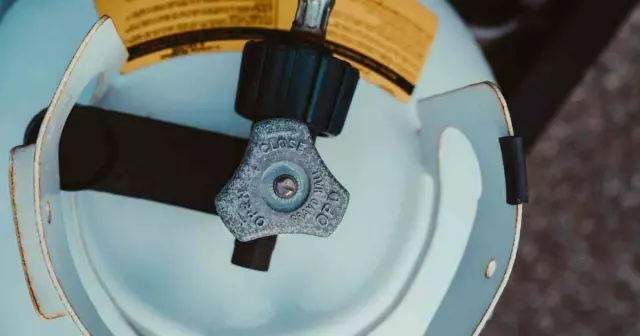
Propane leaks can be extremely dangerous and should be avoided at all costs. Be sure to check all propane tanks regularly for signs of wear or damage such as rust spots or cracks around the valve stem.
If you do find any damage, replace the tank immediately and follow all safety protocols when dealing with propane tanks – including turning off all open flames before replacing or refilling a tank.
Additionally, make sure to inspect hoses connected to propane-powered appliances for any signs of wear or damage as well – if needed, replace these hoses at least once every two years for added safety measures.
Essential RV Fire Safety Equipment
Having the right fire safety equipment in your RV can make all the difference should a fire occur. These are the essential fire safety equipment for RVs and how to properly maintain and use it
Smoke Detectors
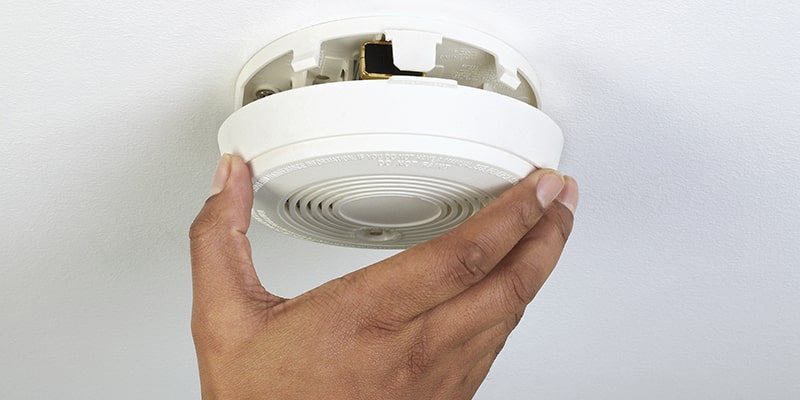
Smoke detectors are one of the most important pieces of fire safety equipment you can have in your RV.
Not only will they alert you when there is smoke present (such as from a kitchen fire) but they will also detect carbon monoxide gas, which is odorless and tasteless but deadly if inhaled over prolonged periods of time.
Smoke detectors should be installed in each room or area of your RV and checked regularly to make sure they’re working properly.
Fire Extinguishers
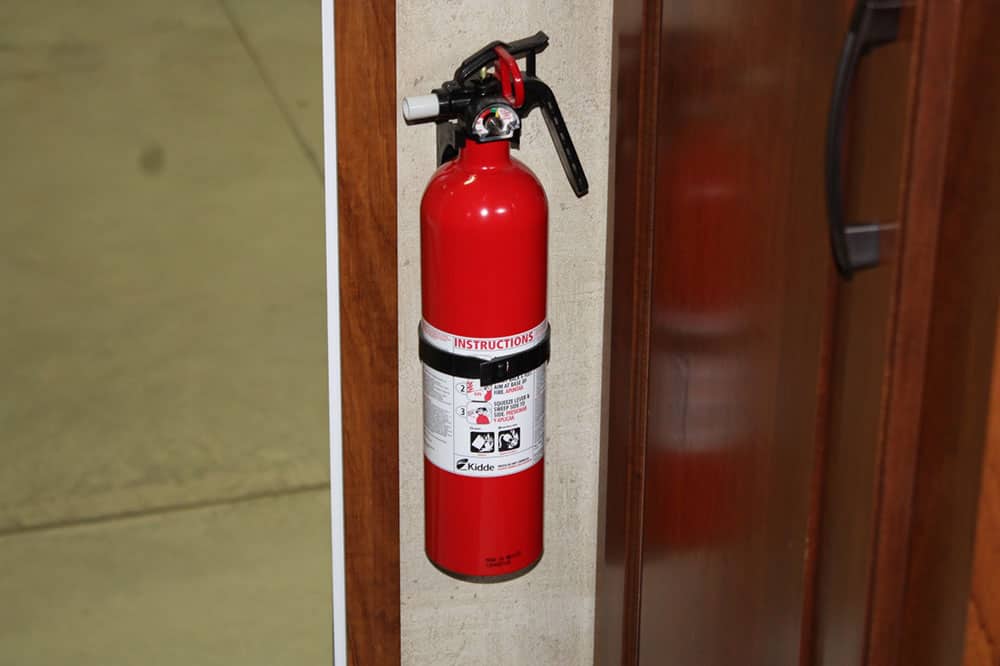
Another must-have piece of fire safety equipment is a fire extinguisher.
Fire extinguishers come in various sizes and are rated according to their effectiveness against different types of fires (A-C). The NFPA requires all RV owners to get B:C rated fire extinguishers
It’s important to select an appropriate size based on the area you plan on using it in and make sure it’s easily accessible so that you can reach it quickly in case of an emergency.
It’s also recommended that you check your extinguisher regularly for any signs of damage or wear-and-tear that may limit its effectiveness during an actual emergency situation.
Emergency Escape Plan
Lastly, having an emergency escape plan is just as important as having the right fire safety equipment installed in your RV.
Your escape plan should include at least two ways out (usually a window or door), so that everyone knows what to do in case there is a fire or other emergency situation while on the road.
Additionally, practice drills are recommended so that everyone knows exactly what needs to be done during an emergency situation without hesitation or confusion.
Understanding RV Fire Safety Regulations and Laws
As an RV owner, you know that safety is paramount when you’re out on the road. That’s why it’s important to understand the regulations and standards set by the federal government, state governments, and local municipalities when it comes to fire safety.
Federal Regulations for RV Fire Safety
The National Fire Protection Association (NFPA) sets national standards for mobile home fire safety and all recreational vehicle manufacturers must comply with these rules.
The NFPA requires that RVs have an ASTM-approved smoke detector, as well as a carbon monoxide detector if there are any fuel-burning appliances in the vehicle.
Additionally, all propane tanks must be equipped with an overfill prevention device and any combustible materials must be treated with a fire retardant.
State and Local Regulations for RV Fire Safety
In addition to federal regulations, each state also has its own laws regarding RV fire safety.
For example, many states require that all recreational vehicles have a fully charged fire extinguisher on board at all times, while others may require that additional smoke detectors be installed in certain areas of the vehicle.
It is important to check your local laws before hitting the open road so you can make sure your RV complies with local regulations.
Finally, some local municipalities may also have their own rules regarding camping or using RVs within city limits. Before camping in a particular place, always double check to make sure there are no additional requirements or restrictions when it comes to having an RV parked in that area.
How to Avoid Electrical Fires in RVs
As an RV owner, it’s important to be aware of the risk of electrical fires. Understanding the ins and outs of RV electrical systems and taking proactive steps to reduce the chances of a fire is essential for protecting yourself, your family, and your property.
Inspect Wiring and Outlets Regularly
It’s important to inspect all wiring and outlets before each camping trip. Make sure there are no frayed wires or broken plugs that could cause a spark or short circuit.
Any exposed wiring should be taped up securely to avoid potential contact with metal surfaces. If you notice any loose connections, get them repaired right away by a qualified electrician.
Avoid Overloading Circuits
With multiple appliances running at once, it’s easy to overload the circuits in an RV.
This can create a dangerous situation where too much electricity is being drawn from one outlet, leading to sparks or even a fire.
Be sure not to overload any circuit by only plugging in as many appliances as the outlet can handle safely. If you need more power than one outlet can provide, look into installing additional circuits or using extension cords with multiple outlets instead.
Check Your Battery and Charger
The battery and charger are crucial components of an RV’s electrical system and should be checked regularly for signs of wear or damage.
Look for any frayed wires, loose connections, or corrosion on the battery terminals, which could indicate a problem that needs to be fixed right away. You should also check your charger periodically to make sure it is working properly and not overheating while charging the battery.
RV Fire safety while cooking
Cooking in an RV comes with some unique challenges. Here are some tips to help keep you safe while cooking in your RV and avoid any accidents that can lead to fires.
Using the Stove/Oven Safely
The stovetop of an RV is usually quite small and may not have as much counter space as a regular kitchen, so it’s important to make sure that all your tools and ingredients are within easy reach before starting to cooking in an RV.
- When using the stovetop, always use only cookware that is designed for this type of appliance and regularly check for signs of wear or damage.
- To prevent spills and splatters from catching fire, be sure to use proper lids on each pan or pot when cooking.
- When using the oven in your RV, always preheat it before putting food inside. This will ensure even cooking temperatures throughout the food.
- Never leave food unattended while it’s in the oven—not even for a few minutes!
- Be sure to turn off the oven immediately after use, as leaving it on can pose a fire hazard.
- Clean the oven regularly to remove any grease or buildup that could cause a fire.
Avoiding overcrowding
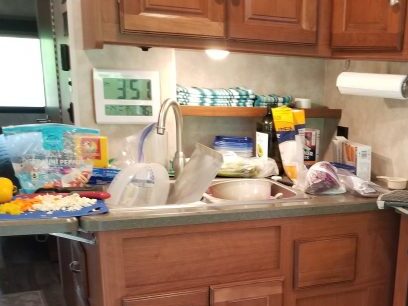
One of the most common mistakes people make when cooking in their RVs is overcrowding their pans or pots with too much food at once.
This can cause uneven cooking temperatures and even create hot spots that can easily ignite any loose debris or spilled liquids nearby. Before turning on any heat source, double-check that nothing flammable is near by—such as paper towels or cardboard packaging —as these items can easily catch fire if exposed to high heat sources for too long.
Keep the area around your stove and oven clear: It’s essential to keep the area around your stove and oven clear of any flammable materials. This means you should never store items like paper towels, dish towels, or other flammable objects near your stove.
Use a stable cooking surface: When cooking on a stovetop, make sure your pots and pans are stable and won’t tip over easily. This is especially important if you’re using a gas stove, as flames can easily spread if a pot or pan tips over.
Use appropriate cookware: Make sure you’re using cookware that’s appropriate for your stove and oven. For example, if you’re using a gas stove, make sure your pots and pans have flat bottoms to prevent them from tipping over.
Keep your RV well-ventilated: Proper ventilation is crucial when cooking in an RV. Make sure you open windows or turn on a fan to help remove any smoke or fumes that may build up while cooking.
Be mindful of propane usage: If you’re using propane to power your stove or oven, be sure to monitor your propane levels regularly. Running out of propane while cooking can be dangerous and lead to a fire.
Essential Propane Safety Measures for RV Owners
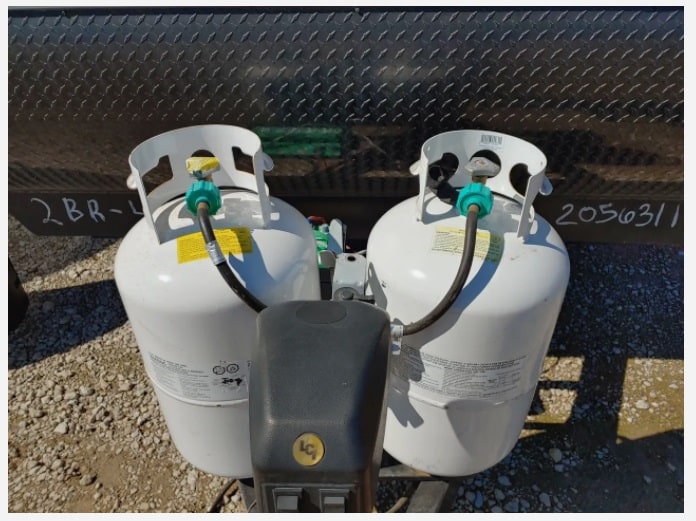
For RV owners and campers, propane is an essential part of life. Whether you’re cooking meals on the stovetop or keeping warm in chilly temperatures, propane can make your time on the road a lot easier. With that said, it’s important to use propane safely—after all, it is a flammable gas!
Checking for Leaks
The first step to using your propane safely is checking for leaks.
This can be done by spraying soapy water onto any connections or valves where the propane tank attaches to your appliance. If there are any bubbles forming around these spots, that means the connection is leaking and should be fixed as soon as possible. It’s also important to check for leaks periodically, just to make sure everything is working properly and no new leaks have developed.
Storing Propane Tanks Safely
It’s also important to store your propane tanks correctly when not in use.
When storing your tanks outdoors, make sure they are placed away from any potential sources of ignition such as open flames or sparks from electrical outlets.
Additionally, you should never leave tanks unattended while they are connected to an appliance; always disconnect them before you go out of sight or range of them.
Using Propane Appliances Correctly
Finally, it’s essential that you use your propane appliances correctly.
Before turning on any device powered by propane (such as a stovetop), make sure all windows and doors in the vicinity are open so there is plenty of ventilation.
Never leave open flames unattended or cook with too much fuel at once—this could lead to dangerous levels of carbon monoxide buildup inside the RV!
Additionally, only use appliances that are specifically designed for outdoor use; indoor-only appliances can be very dangerous in enclosed spaces like RVs.
conclusion
In conclusion, RV fire safety is an essential topic that every RV owner must prioritize. With the increasing popularity of RVs and the risks associated with fire incidents, it’s vital to take all necessary precautions to prevent fire accidents.
By following the tips and regulations discussed in this blog post, such as regular maintenance, investing in fire extinguishers, smoke detectors, and escape plans, RV owners can significantly reduce the chances of experiencing a fire incident.
Always remember that prevention is better than cure, and taking steps to ensure your RV is safe from fire can go a long way in keeping you and your loved ones protected while on the road.

